- Home
- Karen Hawkins
The Prince Who Loved Me (The Oxenburg Princes) Page 2
The Prince Who Loved Me (The Oxenburg Princes) Read online
Page 2
The man eyed the dogs. “Your horses, they growl.” His voice was as silken as thickly napped velvet, and with an accent she didn’t recognize.
“They’re dogs,” she said. “My dogs. I’m sorry if they frighten you.”
Amusement warmed his gaze. “They do not frighten me, little one. It is their health I fear for, not mine.”
She stiffened and moved closer to her dogs. “What does that mean?”
He merely smiled, a lazy, I-never-hurry sort of smile. There was something of the rebel about this man, something that whispered of forbidden kisses and broken rules. He nodded at the dogs. “Make them sit. I do not wish to fight my way to you.”
“Fight—?” She finally noticed the large hunting knife at his belt. “No! Don’t come any closer!”
He looked surprised. “But I must come to you.” His gaze flickered over her, and her body warmed as if he’d used his hands. “You have what belongs to me.”
Her heart gave an odd leap. “What . . . belongs to you?”
“Da.” He nodded to her arms, and she followed his gaze to the little white dog cozily resting there. “She is mine. She was chasing the . . . how you say, krolik?”
Bronwyn blinked.
“The krolik. They run through the fields and live in little holes in the ground.”
“Foxes?”
“Nyet. Those, I know. The other animals.” When she didn’t reply, he sighed, frustration on his face. “They have—what you say—hop, hop. And they have the—” He put his hand behind his head and made a “V,” then wiggled his fingers.
“Ah! You mean hares.”
“Hares, da. Papillon likes to chase them.” He looked approvingly at the dog. “She may have short legs and look like a mop, but Papillon is very quick.”
Bronwyn had to fight for her breath. The softening of the bold lines of his face as he regarded his dog had the power to melt bones. Of the hundreds of men I met during my season in London, none of them affected me like this. “You . . . you have an odd accent.”
His gaze moved back to her. “I am from Oxenburg. It is a country far away from here.”
Her face heated. “I’m sorry. I’m very bad about saying the first thing I think.”
“That is honest, which is good, nyet?”
“Not always.” Certainly not in London, during one’s first season, and definitely not when one was dancing—or trying to dance, and wretchedly at that—with an earl’s son who was tipsy and smelled of onion. Bronwyn had been a wee bit too honest with him and he’d left her on the dance floor, abandoned and humiliated. Worse, to Mama’s chagrin and Bronwyn’s irritation, he’d then mocked her every time their paths had crossed afterward, and had spread some entirely untruthful rumors, too.
Mama had been furious with the earl’s son, though she felt Bronwyn was partly to blame for her thoughtless comments. Papa had said it wasn’t her fault, for Ackinnoull Manor was tucked away far from the dances, dinner parties, and such that might have allowed her to develop a level of control over her unruly tongue. In addition, her mother’s death when Bronwyn had been quite young had made their lives even less social than they might have been. Until her father had remarried, Bronwyn had been left alone with her books and dogs while Papa sank into his work, creating his wonderful inventions.
To be honest, she was glad for that earl’s son, whose name she could no longer remember. His ill behavior had solidified her decision to end her season and never return to London. Even her stepmama now agreed that Bronwyn wasn’t made for London society, nor it her.
They were all happier for that decision, too. Besides, Papa needed Bronwyn’s help with his inventions; she was the only one who knew how to file the valuable patents.
“You do not answer, little one.”
Bronwyn realized the stranger had said something while she’d been lost in her thoughts. “I’m sorry. I was thinking.”
“And you cannot listen while you’re thinking.” He nodded thoughtfully. “I cannot listen and read at the same time, which has given my family much cause for complaint.”
“You like to read?”
He looked surprised. “Who doesn’t?”
Perhaps he is Roland, after all. But no, that was a dangerous way to think. Roland only existed between the pages of books, not in Dingwall. The small dog reached up to lick her chin. “Papillon is an unusual name for a dog.”
“Da. Her name is French for ‘butterfly.’ She is a good hunting dog.”
“While wearing a pink bow?”
His lips twitched. “The hares did not seem to notice as they scampered away from her.”
It was difficult to imagine that this tiny, bepuffed dog belonged to this huge, broad-chested man who could easily hold the animal in one hand. The contrast made her smile, and feel a bit breathless, too.
Bronwyn sighed. This is exactly how Roland would look if he dressed like a huntsman. The beauty of novels was that one never grew tired of the heroes, because as soon as one closed the book and mourned the loss of the characters—for such was the way of good books—one could open another and fall in love all over again. Thus, one was forever being swept off one’s feet. Bronwyn rather liked that.
She wondered what the stranger would look like in a cravat and fitted coat, like Roland wore. This man’s black coat was shapeless and shiny from wear at the elbows. His broad belt was worn, as was the sheath for his hunting knife. Now that he was closer, she could see a quiver of arrows behind his shoulder, the red and black fletching belonging to Selvach, the gamekeeper at Tulloch Castle. Ah. So my Roland is a huntsman, which explains a lot.
A grand old family, the Davidsons, owned Tulloch Castle but rarely inhabited it, preferring to reside in the city. Indeed, Sir Henry hadn’t been to visit his Highland holding in over ten years, which had left Selvach and the other servants to run the castle and grounds as they saw fit. Whenever game threatened to overrun castle lands, Selvach hired men from the surrounding boroughs to thin the herds and flocks, which explained why Bronwyn hadn’t recognized this man.
But of all the huntsmen Selvach had employed over the years, she’d never seen one so pleasantly formed. Her gaze drifted over his obviously muscled chest and lower, down to the man’s breeches, which were tucked into scuffed riding boots. His legs are so muscular. I’ve never seen anyone with such thighs—
“Do I have mud on my breeches, that you stare so?”
Her face heated and she nervously adjusted her spectacles. “Your clothes and the arrows—I see you’re a huntsman.”
Humor glinted anew in his eyes. “I am always on the hunt.”
Bronwyn’s mouth went dry. He’s flirting with me! Never in all her years had that happened. Usually whomever she was speaking with would have stomped off, irritated at the way she blurted out pronouncements, or simply been bored because she hadn’t spoken at all. Her most interesting thoughts always seemed locked in her mind.
“What are you thinking about now, little one? Me?”
“No.”
The huntsman looked astonished, then broke into a deep laugh as he stepped forward.
The deerhounds stiffened, lowering their heads as they growled.
“Walter, Scott, down,” she commanded.
The man looked curious. “Walter and Scott. For the poet, eh?”
“You know of Sir Walter Scott?”
“I like his poetry very well. Your mistress must allow you use of the library.”
Mistress? He thinks I’m a servant. She supposed she looked like one, for she’d donned her most worn gown in preparation for helping with the wash later. Plus, in her hurry to dive into her book, she’d merely scrubbed her face and pinned her hair into a hurried bun that was already falling down, if the tendrils that had fallen at the sides of her face were an indication.
The huntsman moved closer, and Walter leapt forward to stand between him and Bronwyn. A flash of annoyance crossed the man’s face. “Tell your horse to stop growling.”
“He is protec
ting me, as is his job.”
The man looked positively amazed. “I would never harm a woman, little Roza.”
“Roza? Do you mean . . . the flower, a rose?”
The man’s fine mouth curved in a smile. “Yes. You are a roza, with your pink cheeks and”—his gaze swept her from head to toe with obvious approval—“and the rest of you. Bozhy moj, you are a beauty.”
Never in all of her twenty-four years had anyone called Bronwyn a beauty. Pretty, yes. Attractive, several times. But never, ever “a beauty.” Bronwyn had always thought she’d enjoy hearing it, as she’d often read in the pages of her novels, but enjoyment was the last thing she felt. She didn’t know what to say or where to look. Worse, she had to swallow the impulse to deny the truth of the words. Which is silly. I look like Mother, and everyone said she was a very pretty woman.
But somehow, among the dancing lessons (which she’d detested) and the French lessons (which she’d avoided by pretending to be ill) and the endless watercolor instructions (useless, when one had no talent for it), no one had ever taught her how to receive a compliment.
Was a mere “thank you” enough, or would it make her sound conceited, as if she expected such praise? “No one has ever called me beautiful,” she blurted out.
“The men of your country are blind, then.”
She didn’t believe it for an instant, but it was tempting to pretend for a moment that it was true. That society was wrong for favoring reed thinness instead of her plumper form. And that blond hair, which was the current fancy, was pallid beside her rich brown hair. That oh-so-desired white-as-cream skin was boring and bland beside her own tanned and freckled face. So, so tempting—
“I have made you tongue-tied.”
“No, I was trying to decide how to answer your compliment. It seems conceited to accept it and silly to refuse it, but I think—” She dipped a short curtsy. “Thank you for the compliment. It was very kind of you.” She bent down and placed Papillon on the ground. “Good-bye, little dog. Sadly, it’s time for you to go.”
The stranger snapped his fingers. “Come, Papillon.”
The dog took a few steps forward, but then stopped and looked back at Bronwyn. Bronwyn shook her head. “I’m not going with you.”
The stranger snapped his fingers again, this time more sharply. “Come.”
The dog looked between Bronwyn and the stranger and then sat down.
The man gave a muffled curse and strode forward to scoop up the dog, who tried to lick his face. “Stop that, mongrel! You have caused enough trouble.”
Papillon’s tail couldn’t have wagged faster. With a reluctant smile, the man rubbed the dog’s head. “Thank you for capturing her. I hope she didn’t disturb you.” The huntsman’s gaze flickered between Bronwyn’s discarded shoes and her book. “She interrupted your reading, nyet? It’s a good day for reading.”
Bronwyn glanced up at the sun shining through the leaves. “It was, but I must return home. I’ve chores to do.”
He placed the dog at his feet, where it stood expectantly. “Where do you work, little one? Who is your mistress?”
She supposed she could tell him she wasn’t a servant, but something held her back. A whisper of warning that perhaps it would be better if he didn’t know anything more than necessary. “Where I work is none of your concern.”
“You will tell me.” The stranger gave her a quizzical smile that sent an odd shiver through her. “I will know.”
She lifted her chin. “You don’t need to know anything.”
“Ah, but I do.” He walked toward her, ignoring the growls of her deerhounds.
Papillon followed, prancing along, her ribbon dragging behind. As she came abreast of Walter they sniffed one another, tails suddenly wagging. Scott cautiously approached the stranger and sniffed at one of the huntsman’s boots.
Bronwyn took a step back but found her feet unwilling to move any farther away. He was just so tempting.
The huntsman stood directly before her, a wolfish sparkle in his eyes. “This is much better. We can talk more easily now.”
Bronwyn craned her neck to look up into his face. An intriguing scar split one eyebrow. Now that she saw him more closely, she realized his eyes were the most beautiful dark green, his lashes long and thick, shadowing his expression in a mysterious, sensual way.
She could easily drown in such eyes.
“What is your name? The least you can do is tell me that.”
She shouldn’t even be talking to this stranger, alone in the woods like this. Her stepmother would screech in distress at the mere thought.
He shrugged. “Then I will tell you mine. Perhaps then you will feel free to share yours.” He bowed. “I am Alexsey Vitaly Grigori Romanovin.”
“Romanovinin?”
He chuckled, the sound deep in his chest. “Just call me Alexsey. I prefer it.”
“It’s not proper to call someone by his given name unless you know him very, very well.”
“Ah, but soon we will know each other very well. Of this I am certain.”
That simple sentence made her beam with an odd happiness and she said in a flustered voice, “You seem very certain, Mr. Romanovin.”
“Nyet. Alexsey.” He spoke gently, but there was no doubt he expected her to do as he said. He stooped and picked up her book. “What have you been rea—?”
“No!” She held out her hand. “Please return that.”
“Soon. Ah, The Black Duke by Miss Mary Edgeworth.” His gaze shifted back to her. “I’ve never heard of this author.”
“She’s very popular, but only recently.”
“Hmm.” He opened the book and flipped through the pages.
Her chest grew tight. Mama teased her constantly for reading “nonsense,” but Bronwyn loved her books. They let her soar to places far away, to adventures she could only dream of, and to meet people who’d never find her in her tiny corner of the world.
She reached for the book, her fingers just grazing one corner.
“Tsk, tsk. So determined.” Alexsey held it well over her head, a thoughtful look on his face. “What do you read that you must hide it?”
“I’m not hiding anything. It’s not nice to take someone’s book.”
He gave a lazy chuckle. “Do not look so angry, little Roza. I will give it back after I see what you find so fascinating.” He read a few lines to himself, and then lifted his gaze to hers. “Perhaps I should read a few pages aloud, so that we may share th—”
She lunged for the book, her spectacles bouncing on her nose.
“Nyet.” He easily moved the book out of her reach again. He turned a page and then another, finally coming to a stop. “Ah, here. I will read. You will listen.”
He plunged into the story, his deep voice caressing the words. “Love warmed his eyes from blue to gray. ‘It is you I love,’ Roland declared.
“Lucinda threw up her hands. ‘You are mistaken, sir. You don’t know me as you think, for I love no one.’ ” Alexsey made a face. “I do not like that name, Lucinda.”
“Neither do I.” On that, they were in agreement. “She’s a very weak character,” Bronwyn confided. “She’s forever fainting.”
“Fainting?”
Bronwyn threw a hand over her forehead and tossed back her head, closing her eyes in a pretend swoon.
Alexsey chuckled. “You are a good actress, but I would find this a most annoying trait. Characters of such weak heart make for a poor story.”
Indeed—Lucinda’s weakness had been plaguey since the first page.
“Let us hope this Roland finds another woman to love, one not given to such silliness.” Alexsey returned to the book. “ ‘Ha!’ Roland cried. ‘You cannot mean it. I will prove your feelings, for I can see them in your eyes.’
“Lucinda placed a gentle hand upon his cheek. ‘I don’t deserve your love. I’ve doubted you and more—’
“Stilling her anguish, Roland placed his lips upon fair Lucinda’s and kissed her with a ch
aste passion—”
“Pah!” Alexsey frowned.
Bronwyn had fallen into the story as his seductive voice rolled over the words, adding a depth that had her leaning forward in breathless hope. “Don’t stop!”
But he snapped the book closed, his huge hand almost engulfing it. “I cannot continue. It is not a real kiss.”
Her fists balled on her hips. “That is a perfectly good kiss.”
“Nyet.” He reached down, uncurled one of her fists, and placed the book in it. “There is no such thing as ‘chaste passion.’ If chaste is here.” He held his hand far to one side. “Then passion is here.” He held his other hand to the other side, as far away as he could. “When they come together—” He clapped his hands so loudly, it sounded like a thunderclap.
The three dogs looked up in surprise.
Bronwyn’s fingers tightened on the book. “I think it’s a perfectly good kiss.” She’d reread it a dozen times; it was perfect, and she knew it.
There was a slight silence. “You’ve never been kissed.”
“I—I—I—” Her face burned so hotly, she wondered her hair didn’t catch afire. “Of course I’ve been kissed! Dozens of times. Now if you’ll excuse me, I must go. Good day, sir.” How dare he insult Roland’s most romantic moment?
“You are angry I have ruined your story. I am sorry, but the truth is the truth.” He took a step forward, his warm hand closing gently over her elbow.
A flash of tingling heat raced through her. She could easily have broken free had she wished, but there was something about the warmth of his skin on hers, something delicious and shiver-inducing.
Alexsey smiled, his firm lips drawing her gaze as he said in his whiskey-silk voice, “You need a kiss, a taste of true passion. Just enough so you will know why there is no such thing as chaste passion.”
She blinked at him, unable to form a single thought.
His large, warm hand cupped her chin and tilted her face toward his. “I do this so you will know the difference between ‘chaste’ and ‘passion.’ All women should know that.”
Then he captured her lips with his—and in that second, Bronwyn went from unkissed to kissed.

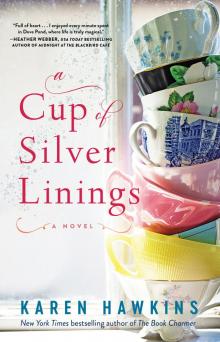 A Cup of Silver Linings
A Cup of Silver Linings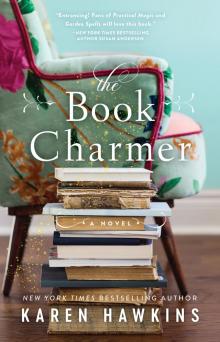 The Book Charmer
The Book Charmer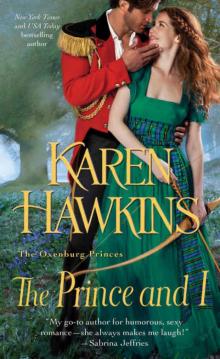 The Prince and I
The Prince and I![Duchess Diaries [2] How to Pursue a Princess Read online](http://i1.bookreadfree.com/i/03/12/duchess_diaries_[2]_how_to_pursue_a_princess_preview.jpg) Duchess Diaries [2] How to Pursue a Princess
Duchess Diaries [2] How to Pursue a Princess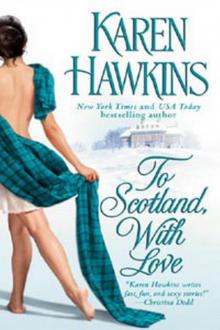 To Scotland, With Love
To Scotland, With Love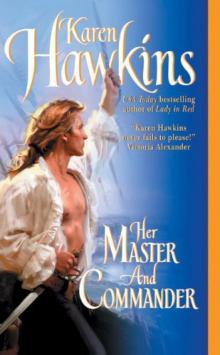 Her Master and Commander
Her Master and Commander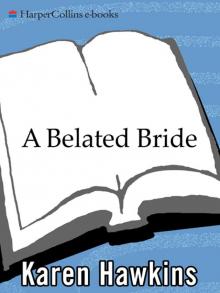 A Belated Bride
A Belated Bride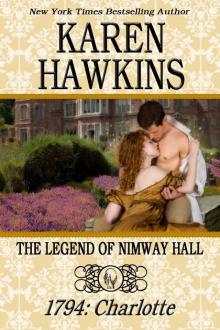 1794_Charlotte
1794_Charlotte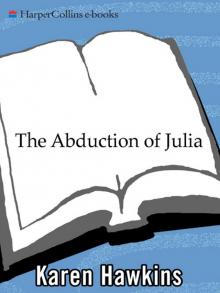 The Abduction of Julia
The Abduction of Julia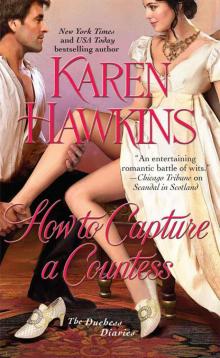 How to Capture a Countess (Duchess Diaries 1)
How to Capture a Countess (Duchess Diaries 1)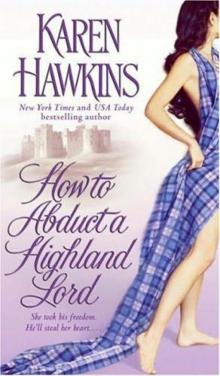 Karen Hawkins - MacLean 1 How to Abduct a Highland Lord
Karen Hawkins - MacLean 1 How to Abduct a Highland Lord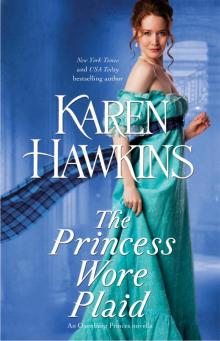 The Princess Wore Plaid
The Princess Wore Plaid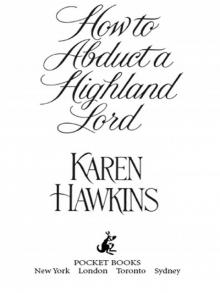 How to Abduct a Highland Lord
How to Abduct a Highland Lord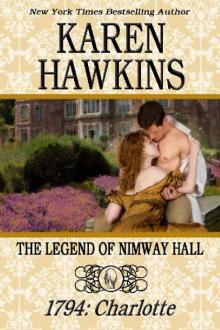 THE LEGEND OF NIMWAY HALL: 1794 - CHARLOTTE
THE LEGEND OF NIMWAY HALL: 1794 - CHARLOTTE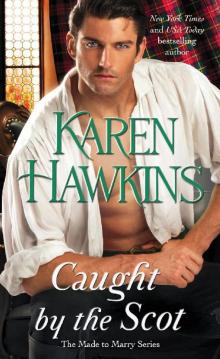 Caught by the Scot
Caught by the Scot The Lady in the Tower
The Lady in the Tower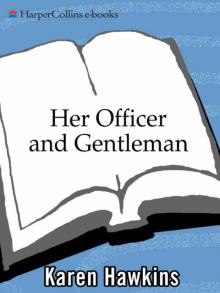 Her Officer and Gentleman
Her Officer and Gentleman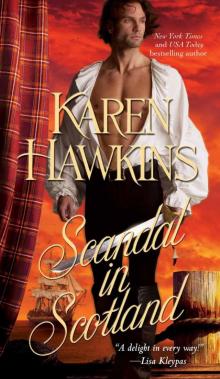 Hurst 02 - Scandal in Scotland
Hurst 02 - Scandal in Scotland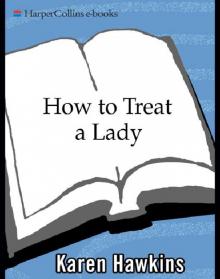 How to Treat a Lady
How to Treat a Lady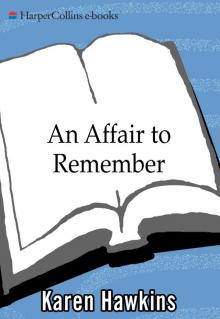 An Affair to Remember
An Affair to Remember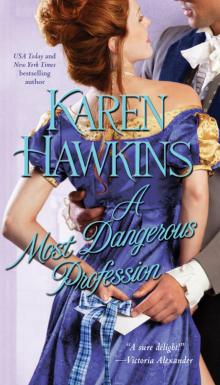 A Most Dangerous Profession
A Most Dangerous Profession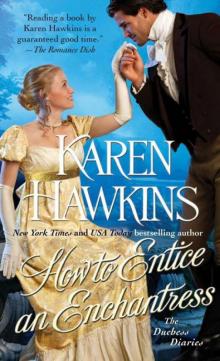 How to Entice an Enchantress
How to Entice an Enchantress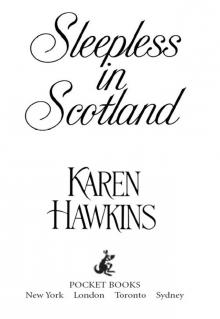 The MacLeans: Sleepless in Scotland
The MacLeans: Sleepless in Scotland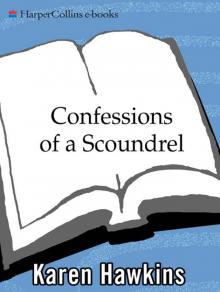 Confessions of a Scoundrel
Confessions of a Scoundrel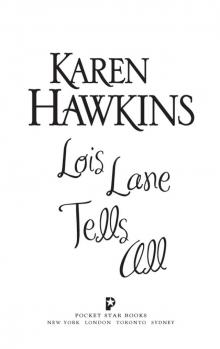 Lois Lane Tells All
Lois Lane Tells All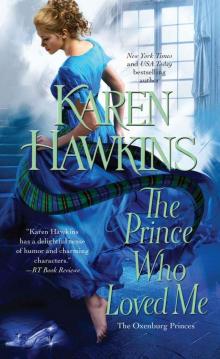 The Prince Who Loved Me (The Oxenburg Princes)
The Prince Who Loved Me (The Oxenburg Princes)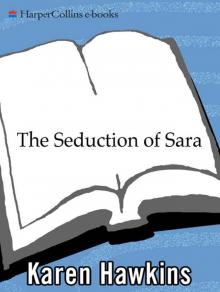 The Seduction of Sara
The Seduction of Sara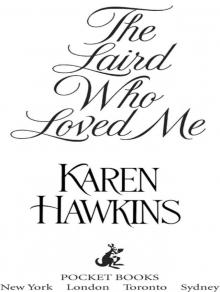 The Laird Who Loved Me
The Laird Who Loved Me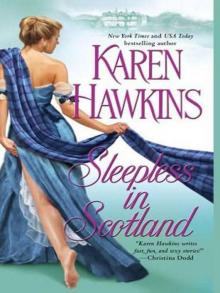 The MacLeans - Sleepless in Scotla
The MacLeans - Sleepless in Scotla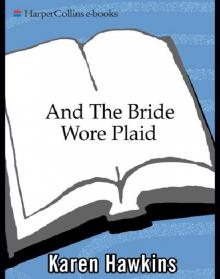 And the Bride Wore Plaid
And the Bride Wore Plaid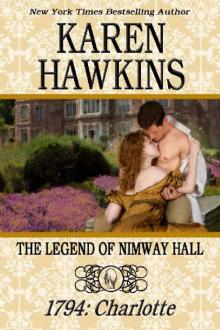 THE LEGEND OF NIMWAY HALL_1794_CHARLOTTE
THE LEGEND OF NIMWAY HALL_1794_CHARLOTTE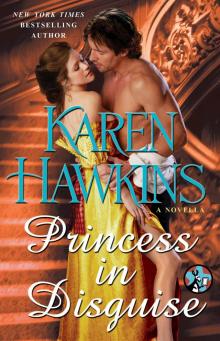 Princess in Disguise
Princess in Disguise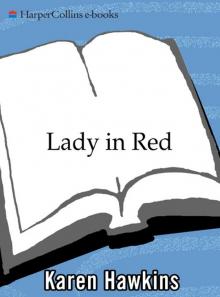 Lady in Red
Lady in Red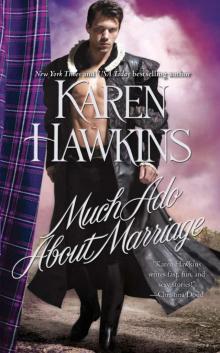 Much Ado About Marriage
Much Ado About Marriage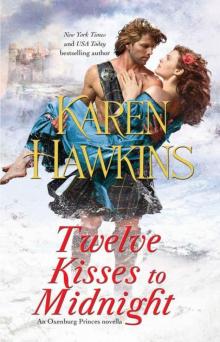 Twelve Kisses to Midnight: A Novella (The Oxenburg Princes)
Twelve Kisses to Midnight: A Novella (The Oxenburg Princes)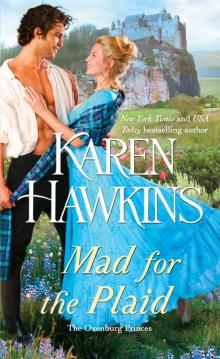 Mad for the Plaid
Mad for the Plaid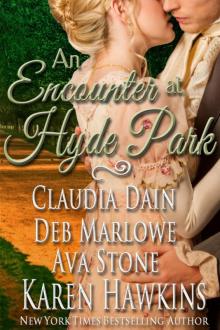 An Encounter at Hyde Park
An Encounter at Hyde Park